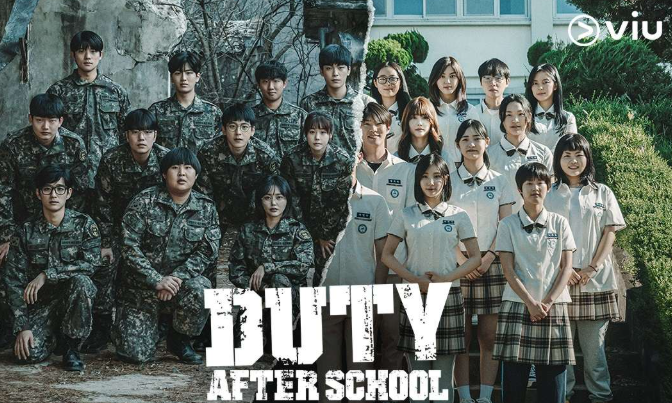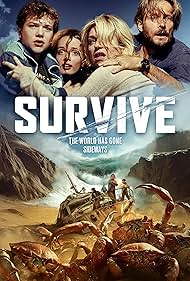1. Plot Summary
Set in a dystopian near future, Duty After School forces all third-year high school students to serve in a sudden military mobilization when mysterious alien objects (purple spheres and insectoid creatures) invade Earth. asianwiki.com+2Rakuten Viki+2
The students of Class 3-2 at Sungjin High School (or Seongjin High) are conscripted into a combat training program under the command of Lieutenant Lee Choon-Ho (Shin Hyun-soo) and Sergeant Kim Won-bin (Lee Soon-won), while their class teacher Park Eun-Young (Im Se-mi) struggles to protect them amid chaos. asianwiki.com+2Wikipedia+2
As alien incursions worsen, the students must learn to fight, survive, make hard choices, and discover the secrets behind the invasion—while dealing with the pressures of youth, fear, loyalty, and betrayal. asianwiki.com+2Rakuten Viki+2
2. Notable Elements
- Genre Fusion & Stakes: The show blends teen drama, military / war action, sci-fi invasion threat, and school life. That mix is ambitious and gives it both emotional and spectacle potential.
- Character Ensemble: With a large cast of students, the series devotes time to various personalities (e.g. Yeon Bo-ra, Kim Chi-yeol, No Ae-seol) and their relationships. Wikipedia+2Rakuten Viki+2
- Training & Combat Sequences: Scenes where students undergo obstacle courses, weapons training, and early skirmishes are tense, especially because many are unprepared teenagers. The contrast between schoolkid and soldier is stark.
- Tonal Shifts & Pacing: Some viewers praise the first half for building tension and world immersion; others criticize the later episodes for rushed plotting or tone inconsistency. IMDb+2Reddit+2
- Visual / Effects & Alien Design: The alien spheres and insectoid creatures have an eerie design; scenes involving their emergence or attack have impact. But given it’s a TV series, sometimes practical / CGI effects show limitations.
- Trailers:
Duty After School | Official Trailer YouTube
Duty After School | MAIN TRAILER YouTube
3. Themes & Messages
- Lost Youth & Forced Maturity: The series emphasizes how adolescents are abruptly thrust into warfare, losing the normal arc of school life, childhood, and planning for the future.
- Duty, Sacrifice & Identity: The notion of “duty” serves as both a burden and a formative journey: students must decide how much to sacrifice, whom to protect, and where their loyalty lies.
- Power & Exploitation: The government’s recruitment of high schoolers raises ethical questions about exploitation of youth in crisis.
- Unity & Division: The show explores how a class (or nation) fractures under stress—bullying, rivalries, disagreements, and collaboration all surface.
- Fear of the Unknown / Otherness: The alien invaders are mysterious; the show plays with fear of the unknown, surprise betrayal, and alien hostility as metaphor for external threats.
Although not a holiday story, one could see parallels: unity in crisis
4. Personal Impressions
Strengths:
- The initial episodes are gripping—introducing a strong premise and making us care about students suddenly fighting for survival.
- The contrast between school life (exams, relationships, stress) and war is compelling and emotionally loaded.
- Some characters (especially Lee Choon-Ho, Park Eun-Young) are written with nuance—authority figures balancing duty and care.
- The alien threat and the suspense over what’s really behind the spheres are engaging motivators.
Weaknesses / Criticisms:
- As the series progresses, many viewers and fans of the original webtoon note that plotting becomes convoluted, rushed, or inconsistent. Reddit+2Reddit+2
- Some character arcs are underexplored due to the large ensemble—some students get sidelined.
- The ending, especially in the final episodes, is controversial — many feel it departs from earlier tone or loses coherence. Reddit+2IMDb+2
- The shift from closer character moments to large-scale disaster sometimes feels abrupt.
Overall, it’s a bold series that often delivers tension and emotional stakes, though its later stretch stumbles under its own ambition.
5. Audience Recommendations
You’ll probably enjoy Duty After School if:
- You like K-dramas with a twist—school settings, teenage relationships merged with sci-fi / action.
- You enjoy high stakes, ensemble survival dramas (think All of Us Are Dead, Battle Royale elements).
- You don’t mind some narrative compromises in favor of spectacle and emotional drama.
- You like watching characters grow under pressure, making hard decisions in crisis.
You might dislike or be frustrated if:
- You demand tight plotting and satisfying resolutions above all else.
- You dislike large casts where not all get equal depth.
- You prefer consistency of tone from start to finish.
6. Conclusions & Rating
Duty After School starts strong: a bold premise, well-drawn initial suspense, and a mix of personal drama and alien invasion. It distinguishes itself by forcing normal students into war, exploring how youth adapt under existential threat. However, its ambition also betrays it: pacing issues, tonal shifts, and a controversial ending dilute its impact.
Final recommendation: It’s worth watching—for as long as it holds you—and especially in its first half and premise. But temper expectations for the latter episodes. For K-drama / sci-fi fans, it’s a novel ride even if imperfect.
Star Rating: ★★★☆☆ (3 out of 5)
Watch more:




